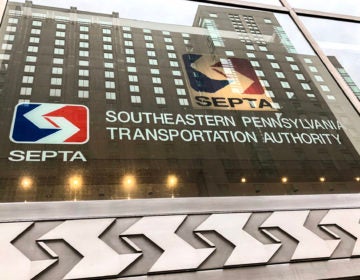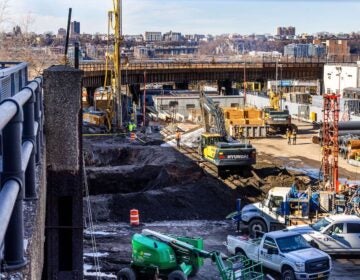Bus late during an emergency? This pilot program will help you get where you need without spending a dime
The pilot enhancement will apply to riders of the 110, 111, 114 and 117 bus routes that serve the Fair Acres region.

A SEPTA bus waits at the Penn State Brandywine bus stop, served by routes 110, 111 and 117 and part of the Clean Air Council's Emergency Ride Home voucher-based pilot enhancement. (Gabriel Donahue/WHYY)
Have a question about Philly’s neighborhoods or the systems that shape them? PlanPhilly reporters want to hear from you! Ask us a question or send us a story idea you think we should cover.
For 20 years, a regional program has offered a safety net to commuters who bike, carpool or take transit when plans fall through. Now, a new grant-funded pilot is removing a hurdle — the upfront price tag of up to $50.
The Emergency Ride Home service, available in Philadelphia and its collar counties, reimburses users for ride shares in cases of emergency up to twice a year. The Delaware Valley Regional Planning Commission, which hosts the program, has 45 days to send the payment back to the rider.
Stacy Bartels, who manages the Office of Transportation Demand Management at the commission, said that’s standard for some similar programs in other regions, but it does come with a setback.
“The user has to pay the fee for whatever alternative ride they take,” Bartels said. “Even though that allows for fairly good accountability since they have to put the money out, that’s a big ask for some people, especially if you’re getting close to the $50 limit to have that available … to pay up front.”
Thus, the Clean Air Council is testing a voucher-based version of the service. When a bus is “seriously delayed, canceled, or doesn’t reach the site of the emergency,” stranded riders can activate a $50 voucher on the Uber app, according to the organization.
It is available in the Fair Acres region for regular riders of SEPTA bus routes 110, 111, 114 or 117.
“In Center City, there [are] so many different routes … If your direct line is not running, you could take a different one and get to where you’re going,” CAC’s Sustainable Transportation Program Manager Titania Markland said. “But within [Fair Acres], for example, if your 110 misses you, the 114 may not get you to where you are going.”
Routes 111 and 117 run every half hour, routes 110 and 114 run hourly and all are subject to 20% service reductions beginning Aug. 25 due to a lack of state funding. SEPTA’s systemwide service reductions will not affect the program since the routes piloting the voucher will continue to run, Markland said.
The routes were chosen, she said, based on delay and cancellation rates as indicated in discussions with SEPTA.
Latrice Ash, who works at Fair Acres and takes the 114 bus, said that in her experience, the service has been more consistent recently, but recalls a series of cancellations earlier in the year due to operator unavailability.
“If they don’t have nobody, they don’t send nobody,” she said at the Fair Acres bus stop after her shift. “So then we gotta wait a whole ‘nother 30 minutes for the next bus to come, or an hour.”
With that in mind, Ash’s coworker Kiwann Jones, a 117 rider, called the program “something that you definitely can’t deny.”
“It’s fast travel, it’s free for emergencies, and you ain’t got to wait for every hour,” Jones said.
And Markland believes the service could, in turn, boost ridership.
“With this system, people may actually take SEPTA more because they have something to rely on if something comes up and the bus is canceled, late or whatever the case is,” Markland said.
The requirements to use the voucher are the same as for the general service: prospective users must live or work in southeastern Pennsylvania, and commute using alternative modes of transportation at least twice a week. Alternative modes include car- and vanpooling, public transit and cycling.
Users also must register through the Share-A-Ride program at least 24 hours before using the voucher or becoming eligible for reimbursement. That’s why Bartels hopes to increase the number of people signed up for the program, so they can benefit from it when an emergency comes up.
“Thankfully, we don’t get a lot of usage of it, which means people don’t have a lot of emergencies, and we don’t have to be concerned about people abusing the service,” she said. “On the other hand, we would like to see more people signed up, and we would like to see it being used — obviously when it is actually necessary — but we would like to see people benefit from it, especially if it means that they could take transit or carpool more often than they might currently be doing.”
Valid emergencies include an immediate family member’s illness or accident, unscheduled overtime, a carpool vehicle breaking down or a carpool driver having an emergency that makes them unable to transport others, according to the DVRPC reimbursement form. Weather or crashes are not covered.
The pilot is funded by a $100,000 grant, awarded as part of the DVRPC’s travel options program.
The DVRPC and CAC will accept feedback via a post-survey to review for possible adjustments that will begin in January and run until the end of the pilot next June. From there, the DVRPC will decide whether to implement the voucher regionwide and eliminate the reimbursement system entirely.

Get daily updates from WHYY News!
WHYY is your source for fact-based, in-depth journalism and information. As a nonprofit organization, we rely on financial support from readers like you. Please give today.







